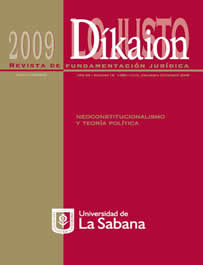Machiavellism: Concept and Meaning. A Reading from virtù
Keywords:
Machiavelli, Machiavellism, virtù, political virtue, power.Abstract
Machiavellism or “machiavellian” are concepts used often as synonyms of immorality or of subordination of means to an end (a kind of embryonic utilitarianism). A more profound reading of The Prince, together with the analysis of the other works by Mac hiavavelli, reveals that the Florentine political writer was far from that thought. Works like those ones by Pocock and Lefort’s provide for an interesting rereading, from which it can be deduced that “Machiavellism” or “machiavellian” are not moral doctrines, but a way (amoral) of understanding power–more specifically, real relations of power. Here, the notion of virtù plays an essential role, since it involves the way in which Mac hiavavelli understands power and politics, being also the reason of the ambiguous interpretations towards the Florentine writer. Every ruler must be virtuous in a classic and in a machiavellian way. The ruler who is virtuous only in a machiavellian sense will be immoral, and the one who is virtuous only in a classical sense is or will be irresponsible.
Downloads
How to Cite
Issue
Section
License
1. Proposed Policy for Journals That Offer Open Access
Authors who publish with this journal agree to the following terms:
This journal and its papers are published with the Creative Commons License Attribution-NonCommercial-NoDerivatives 4.0 International (CC BY-NC-ND 4.0). You are free to share copy and redistribute the material in any medium or format if you: give appropriate credit, provide a link to the license, and indicate if changes were made; don’t use our material for commercial purposes; don’t remix, transform, or build upon the material.






